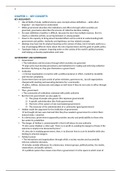Samenvatting
Summary Comparative Government and Politics - Hague & Harrop & McCormick
- Instelling
- Universiteit Leiden (UL)
Samenvatting van Comparative Government and Politics door Hague, Harrop & McCormick. Summary of Comparative Government and Politics by Hague, Harrop & McCormick. Let op: deze samenvatting is specifiek gemaakt voor het vak Introduction to Comparative Politics, dus niet alle hoofdstukken van het boek...
[Meer zien]





